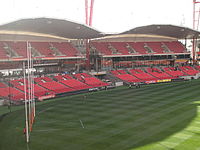
The Sydney Swans are a professional Australian rules football club based in Sydney, New South Wales. The men's team competes in the Australian Football League (AFL), and the women's team in the AFL Women's (AFLW). The Swans also field a reserves men's team in the Victorian Football League (VFL).
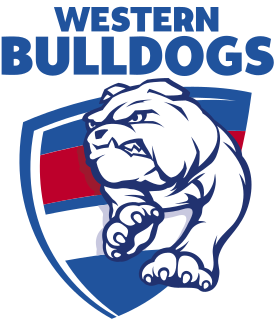
The Western Bulldogs are a professional Australian rules football team that competes in the Australian Football League (AFL), the sport's premier competition.
The 2004 AFL season was the 108th season of the Australian Football League (AFL), the highest level senior Australian rules football competition in Australia, which was known as the Victorian Football League until 1989. The season featured sixteen clubs, ran from 26 March until 25 September, and comprised a 22-game home-and-away season followed by a finals series featuring the top eight clubs.
Rivalries in the Australian Football League exist between many teams, most of which typically draw large crowds and interest regardless of both teams' positions on the ladder. The AFL encourages the building of such rivalries, as a method of increasing publicity for the league, to the point of designating one round each year as "Rivalry Round" when many of these match-ups are held on the one weekend. Whilst some rivalries, such as between teams from adjacent areas, are still strong, the designation of an entire round of fixtures as a Rivalry Round is often criticised due to some arbitrary match-ups, or ignoring stronger and more recent rivalries.

The Greater Western Sydney Giants are a professional Australian rules football team based in Sydney Olympic Park, which represents the Greater Western Sydney region of New South Wales and Canberra in the Australian Capital Territory (ACT).
The Australian Football League's 2008 Finals Series determined the top eight final positions of the 2008 AFL season. It began on the weekend of 5 September 2008 and ended with the 112th AFL Grand Final at the Melbourne Cricket Ground on 27 September 2008. The Hawthorn Football Club were crowned the 2008 AFL Premiers, beating the Geelong Football Club by 26 points in front of a crowd of 100,012.
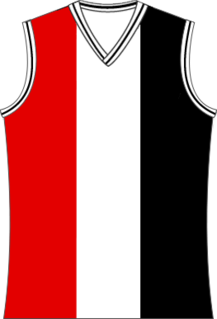
St Kilda Football Club competed in the 2009 Australian Football League (AFL) premiership season. They won a club record 19 consecutive matches between Round 1 and Round 19 of the season and qualified for the 2009 finals series in first position as the minor premiers – the club's third minor premiership. The club won through to the 2009 AFL Grand Final after qualifying and preliminary finals wins, but were defeated by Geelong by 12 points.
The AFL Australian Football League is the top professional Australian rules football league in the world. The league consists of eighteen teams: nine based in the city of Melbourne, one from regional Victoria, and eight based in other Australian states. The reason for this unbalanced geographic distribution lies in the history of the league, which was based solely within Victoria from the time it was established in 1897, until the time the league expanded through the addition of clubs from interstate to the existing teams starting in the 1980s; until this expansion, the league was known as the VFL (Victorian Football League).

The 2014 AFL Grand Final was an Australian rules football game contested between the Sydney Swans and the Hawthorn Football Club at the Melbourne Cricket Ground on 27 September 2014. It was the 119th annual Grand Final of the Australian Football League, staged to determine the premiers for the 2014 AFL season. The match, attended by 99,460 spectators, was won by Hawthorn by a margin of 63 points, marking the club's second consecutive premiership and twelfth VFL/AFL premiership victory overall. Hawthorn's Luke Hodge was awarded the Norm Smith Medal as the best player on the ground.

The 2014 Australian Football League finals series is the 118th annual edition of the VFL/AFL final series, the Australian rules football tournament staged to determine the winner of the 2014 AFL Premiership Season. The series ran over four weekends in September 2014, and culminated with the 2014 AFL Grand Final at the Melbourne Cricket Ground on 27 September 2014.
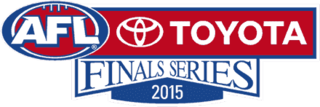
The 2015 Australian Football League finals series was the 119th annual edition of the VFL/AFL final series, the Australian rules football tournament staged to determine the winner of the 2015 AFL Premiership Season. The series ran over four weekends in September and October 2015, culminating with the 2015 AFL Grand Final at the Melbourne Cricket Ground on 3 October 2015. Hawthorn won the match by 46 points against West Coast, recording their third consecutive premiership. The match was played in October, due to the season starting later than usual.
The 2016 AFL season was the 120th season of the Australian Football League (AFL), the highest level senior Australian rules football competition in Australia, which was known as the Victorian Football League until 1989.
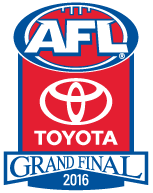
The 2016 AFL Grand Final was an Australian rules football game contested between Sydney and the Western Bulldogs at the Melbourne Cricket Ground on 1 October 2016. It was the 121st annual Grand Final of the Australian Football League, staged to determine the premiers of the 2016 AFL season. The match, attended by 99,981 spectators, was won by the Bulldogs by a margin of 22 points, marking the club's second VFL/AFL premiership victory and first since 1954. It was the first time in VFL/AFL history that a team won the premiership from seventh place on the ladder. Jason Johannisen of the Bulldogs was awarded the Norm Smith Medal as the best player on the ground.
The 2016 season was the Hawthorn Football Club's 92nd season in the Australian Football League and 115th overall, the 17th season playing home games at the Melbourne Cricket Ground, the 16th season playing home games at Aurora Stadium, the 12th season under head coach Alastair Clarkson, and the 6th season with Luke Hodge as club captain. Hawthorn entered the season as the three-time defending AFL premiers, having won back-to-back-to-back AFL premierships.
The 2017 AFL season was the 121st season of the Australian Football League (AFL), the highest level senior men's Australian rules football competition in Australia, which was known as the Victorian Football League until 1989. The season featured eighteen clubs, ran from 23 March until 30 September, and comprised a 22-game home-and-away season followed by a finals series featuring the top eight clubs.

The 2017 Australian Football League finals series was the 121st annual edition of the VFL/AFL final series, the Australian rules football tournament staged to determine the winner of the 2017 AFL Premiership Season. The series ran over four weekends in September 2017, culminating with the 2017 AFL Grand Final at the Melbourne Cricket Ground on 30 September 2017.

The 2016 AFL First Preliminary Final was an Australian rules football match contested between the Greater Western Sydney Giants and Western Bulldogs at Spotless Stadium on 24 September 2016. It was staged as part of the 2016 AFL finals series to determine which of the two clubs would qualify for that season's Grand Final.
The 2019 Australian Football League finals series was the 123rd annual edition of the VFL/AFL final series, the Australian rules football tournament staged to determine the winner of the 2019 AFL Premiership season. The series ran over four weekends in September 2019, culminating with the 2019 AFL Grand Final at the Melbourne Cricket Ground on 28 September 2019.
The 2021 Australian Football League finals series was the 125th annual edition of the VFL/AFL finals series.
The 2022 Australian Football League finals series was the 126th annual edition of the VFL/AFL finals series, the Australian rules football tournament staged to determine the winner of the 2022 AFL premiership season. The series was played over four weeks in September and culminated in the 2022 AFL Grand Final.



